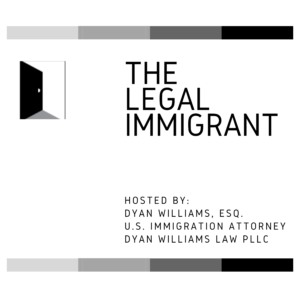On February 18, the U.S. Citizenship Act of 2021 was introduced in the House by California Congresswoman Linda Sánchez and in the Senate by New Jersey Senator Robert Menendez. The White House first announced the bill on January 20, which was the first day of the Biden Administration.
The bill is 353 pages long. It contains sweeping provisions that, if passed, will overhaul many parts of the U.S. immigration system.
It seeks to give certain undocumented immigrants Lawful Prospective Immigrant (LPI) status and an 8-year path to U.S. citizenship; allow eligible DREAMERS, TPS holders and farmworkers to immediately apply for permanent residence; repeal the 3/10 year unlawful presence bar under INA 212(a)(9)(B) and the permanent bar under INA 212(a)(9)(C); and create an exception to the misrepresentation of citizenship bar for any person who was under age 21 when the false claim was made.
In Episode 8 of The Legal Immigrant podcast, I focus on the following provisions in the reform bill:
1. Section 1101, Adjustment of Status of Eligible Entrants to that of Lawful Prospective Immigrant (LPI), and Section 1102, Adjustment of Status of Lawful Prospective Immigrants
- Provides earned 8-year path to citizenship for certain undocumented immigrants who have been present in the U.S. on or before January 1, 2021, and certain persons who were removed from the U.S. on or after January 20, 2017, but were inside the U.S. for at least 3 years prior
2. Section 3104, Promoting Family Unity
- Repeals the 3/10 year bar under INA 212(a)(9)(B) due to accrual of more than 180 days of unlawful presence in the U.S. prior to departure
- Eliminates the permanent bar under INA 212(a)(9)(C) due to illegal re-entry following more than 1 year of unlawful presence or following a removal order
- Creates exception to the false claim to U.S. citizenship bar under INA 212(a)(6)(C)(ii) for persons who made the misrepresentation when they were under age 21
Key points to consider:
1. The Immigration Reform bill is bicameral (introduced in the House and Senate on February 18), but is not bipartisan (sponsored by Democrats only and no Republicans).
The comprehensive nature of the bill and the big changes proposed will make it harder to get the necessary votes. Moderation could be needed especially when Democrats have a slight margin in the House and a 50-50 split in the Senate. Vice President Harris has the tie-breaking vote. But a supermajority of 60 senators is normally needed to pass major legislation in the Senate.
To move forward, the full legislation might have to be split up into separate smaller bills, or get added to the budget reconciliation process. Some Republicans have voiced opposition to the Biden Administration’s approach to immigration reform.
2. Even if the law is passed and signed by the President, it may take up to a year for the new rules to be drafted. And it will take some time for the new application processes and forms to be rolled out and implemented. The applicant will also have to gather documents, including evidence of identity, proof of physical presence in the U.S. for the period that is required by law, and supporting records for any waiver of inadmissibility that is needed.
3. If you already qualify for another way to immigrate to the United States, such as by employment-based immigration or by a legal, bona fide marriage to a U.S. citizen, it’s better to use the existing path instead of wait for the results of this reform bill.
4. You must not deliberately fall out of status or illegally re-enter the U.S in the hope that you will be eligible for LPI status or other immigration benefits that have yet to be passed into law. Unlawful presence and illegal re-entries to the U.S. continue to have serious immigration consequences unless the law is amended to get rid of them.
Resources cited:
- Full text to the U.S. Citizenship Act of 2021 available on Representative Linda Sánchez’s website and Senator Robert Menendez website
- Republican Staff Report from Representative Jim Jordan and Representative Tom McClintock, How the Biden Administration’s Immigration Proposals Risk Undoing the Success of the Trump Administration, available on Republicans Judiciary Committee website
For more information on inadmissibility waivers, see:
Consent to Reapply for Admission – I-212 Waiver: Remedy to Overcoming INA 212(a)(9)(A) and (C) Bars
When do you need an I-212 Waiver (and how do you get it)?
What should you do to get your I-212 Waiver?
When do you need an I-601 waiver due to unlawful presence (and how do you get it)?
212(d)(3)(A) Nonimmigrant Waiver: Advantages and Disadvantages
# # #
The Legal Immigrant podcast and this article provide general information only. It is based on law, regulations and policy that are subject to change. Do not consider it as legal advice for your situation. The sharing or receipt of this information does not create an attorney-client relationship.

